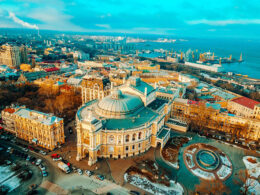As Transnistria, a self-proclaimed pro-Russian republic within Moldova, is grappling with a severe energy crisis, its regional leader expressed gratitude to those who had historically built homes with traditional wood-burning stoves, noting that many private residences, particularly in rural areas, had maintained their original stoves which could now be reactivated.
This comes as Ukraine ceased the transit of Russian gas through its territory on 1 January to undermine Russia's ability to finance its ongoing war efforts. On the same day, Russia’s Gazprom also suspended gas deliveries to Moldova, citing unpaid debts by Moldovagaz, the state-owned gas company.
Approximately 1,500 apartment buildings have lost access to heating and hot water, while 72,000 private homes are without gas service, according to the President of the self-proclaimed Transnistrian Moldovan Republic Vadim Krasnoselsky.
The situation has forced 150 gas boiler facilities to shut down, with two major social institutions switching to diesel fuel heating.
Krasnoselsky emphasized that the region's abundant wood resources and existing reserves would help address the heating needs.
"Today we gratefully mention those who built houses with stove heating," Krasnoselsky wrote on his Telegram channel.
The administration has established fuel distribution points across all districts, offering free firewood delivery to vulnerable citizens.
“There are no dead-end situations. If you can't cope on your own - ask for help,” Krasnoselsky wrote.
The energy shortage has also led to increased electricity consumption, resulting in grid instability. In response, the government has implemented a rolling blackout schedule to prevent system overload and urged residents to use energy-efficient appliances.
In December, Moldova's parliament declared a 60-day energy emergency in anticipation of Russian Gazprom's suspension of gas supplies.
According to Moldovagaz, while the Russian gas had been primarily directed to Transnistria, Moldova proper has been securing its gas supply through regional and European markets.
Related:
- “Historic event”: Ukraine halts Russian gas flow to Europe
- Gas supply ends in Moldovan Transnistria after Ukraine halts Russian gas transit
- Russian-backed Transnistria rejects EU gas despite supply crisis
- Russian gas cutoff triggers rolling blackouts in Moldova’s Russian-controlled Transnistria





